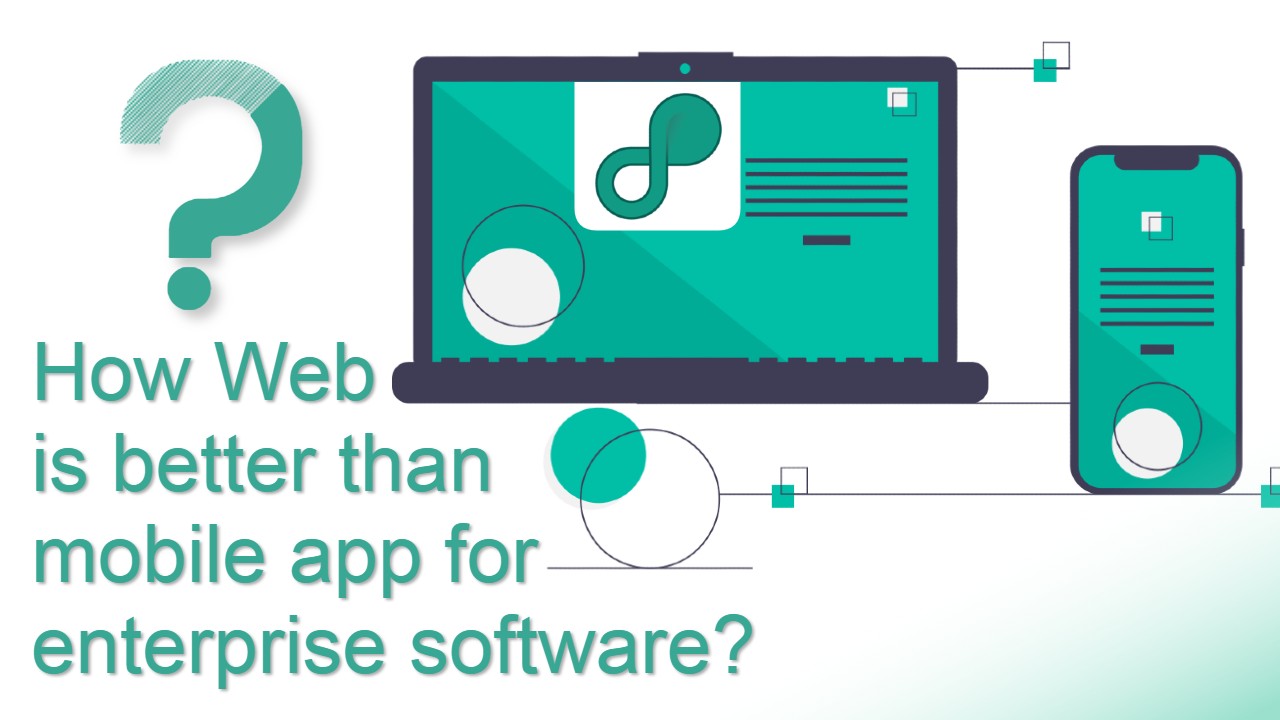23 Dec

The choice of the best-fit software for the enterprise needs usually depends on a variety of parameters, such as type and size of an organization, scope of tasks completed by its personnel, business requirements, area of usage, available budget, and so much more. Both web and mobile apps can cover the particular needs of enterprises. The question is whether it’s rational to use them interchangeably and which solution should be developed first?
Hence, let’s first consider what gaps a web app may fill in the organization that is about to integrate it. In general, the purposes of the custom web app development for the needs of a particular enterprise vary. Such software may be created to streamline the business, digitize paper-related activities, simplify the completion of certain tasks, or automate particular internal processes. The enterprise may also opt for web development with a client-oriented goal, namely to improve their services with the help of a digital format.

If we examine the advantage of web apps over mobile ones in terms of a type of organization and the scope of tasks it completes, we may conclude that in the case of the most large-sized enterprises, web development wins. For instance, let’s imagine that a particular organization requires a robust e-commerce platform, portal web app, enterprise resource planning system (ERP), or a highly-functional application with an embedded content management system (CMS). In such a case, a web environment will allow more flexibility, scalability, and diversity in terms of functionality.
Once the organization identifies the type of the required web application that would meet all the requirements, the next step is to define a few vital aspects. Firstly, whether the target audience, namely enterprise employees, prefer using web browsers rather than native or hybrid apps. This can be determined during the Business Analysis, via special tools like Google Analytics, with the help of user persona creation, and so much more. This aspect is highly important, since the wrong choice of enterprise software may result in significant expenses and wasted time.
Secondly, it’s crucial to figure out whether the company is going to apply dynamic updates to this software since web apps provide more flexibility and scalability in this case. Finally, we advise determining whether a company needs a powerful management tool for internal and external operations. If the answers to all questions mentioned above are positive, then the company should definitely opt for a web application development.

Considering the benefits the web app can bring to the enterprise, we can divide them into customer-centric (external) and enterprise-oriented (internal). In the first case, web apps can help the enterprise improve the services they deliver to their users by streamlining the whole workflow processes. Also, companies can win in terms of competition, since web apps can help enter a specific domain on the market faster and provided that the product was developed properly, stand out among others. Finally, with a web app, an enterprise can provide its users with a streamlined convenience since it can often be accessed from any place, device, and is usually embedded with 24/7 customer support.
Regarding the enterprise-oriented (internal) benefit of web apps, we can note that such software can enable enterprises with a set of convenient tools for the automation of the majority of business processes. For instance, robust e-commerce web apps are often embedded with a variety of options for content marketing and sales. They also can provide an omnichannel engagement to help enterprises collect data easier regarding the users’ behavior and then make certain amendments according to the gathered results.
In the case of CMSs, such web applications can offer diverse functionality for simplified website changes, convenient collaboration tools, and great customization. Hence, web apps can usually be tailored to most of the enterprise requirements. ERP software, in turn, can simplify and improve the communication among numerous departments of the enterprise (marketing, accounting, HR, etc.), improve planning and scheduling, and increase the overall productivity of the organization.
The reason we divided the benefits into two large groups is that they depend on what kind of enterprise requires a web app. If it provides certain types of products or services, the web app will allow the company to satisfy its users’ needs in a greater way and will offer them more opportunities. However, if the company aims to streamline and digitize its business processes, it will definitely obtain the required enhancements with a web app.
Also, the advantage of a web application over mobile can be analyzed in terms of the simplicity of the development and required resources. Web apps possess cross-platform and browser capabilities. It means that they can be accessed from a bigger number of devices and browsers if a software vendor makes it mobile-friendly and responsive. In the case of the native mobile apps, they have to be tailored particularly to the requirements of either Android or iOS platforms. Hence, it narrows the app’s accessibility for certain groups of users unless the enterprise opted for hybrid app development or native one for both platforms.

Let’s consider a few more advantages of web apps over mobile ones. Needless to say that unlike the mobile app, a web app can automatically update itself once its content or functionality changes. Also, the company doesn't have to overcome a long way of obstacles related to the app store approval. Moreover, in terms of technical maintenance and degree of customizability, web apps are significantly easier and more flexible than mobile apps.
However, not everything is so clear-cut for mobile app development. No doubt that the growing number of people uses mobile apps every year. According to the statistics, over 5 billion users are currently using mobile devices all over the world. Additionally, there are more than 2.6 million Android and 2.2 million iOS apps on the market. Such data allows us to conclude that mobile apps are in high demand and don’t give way to web apps.

Moreover, there are a number of advantages that mobile apps have over web ones. For instance, enterprise employees can access the app in an offline regime. It also allows enterprises to use in-built device features if it’s necessary for work. It can be highly convenient in such industries as legal, medical, and manufacturing. App notifications (push and in-app) aspect is another great benefit of mobile apps since the user can immediately check them and get rid of web app inconveniences, such as the need to reload a web page.
Based on our experience, the customers that turned to our services opted for a web application development since such type of enterprise software was able to cover the majority of their business and technical requirements. Some of them decided to extend their digital presence eventually and added a mobile app to the scope of the enterprise software they used. In certain cases, it was done to provide more convenience to their employees, in others to provide better services to their users with the help of easier data gathering, management, collaboration among departments, etc.
















Research Done by: Vladlen Shulepov